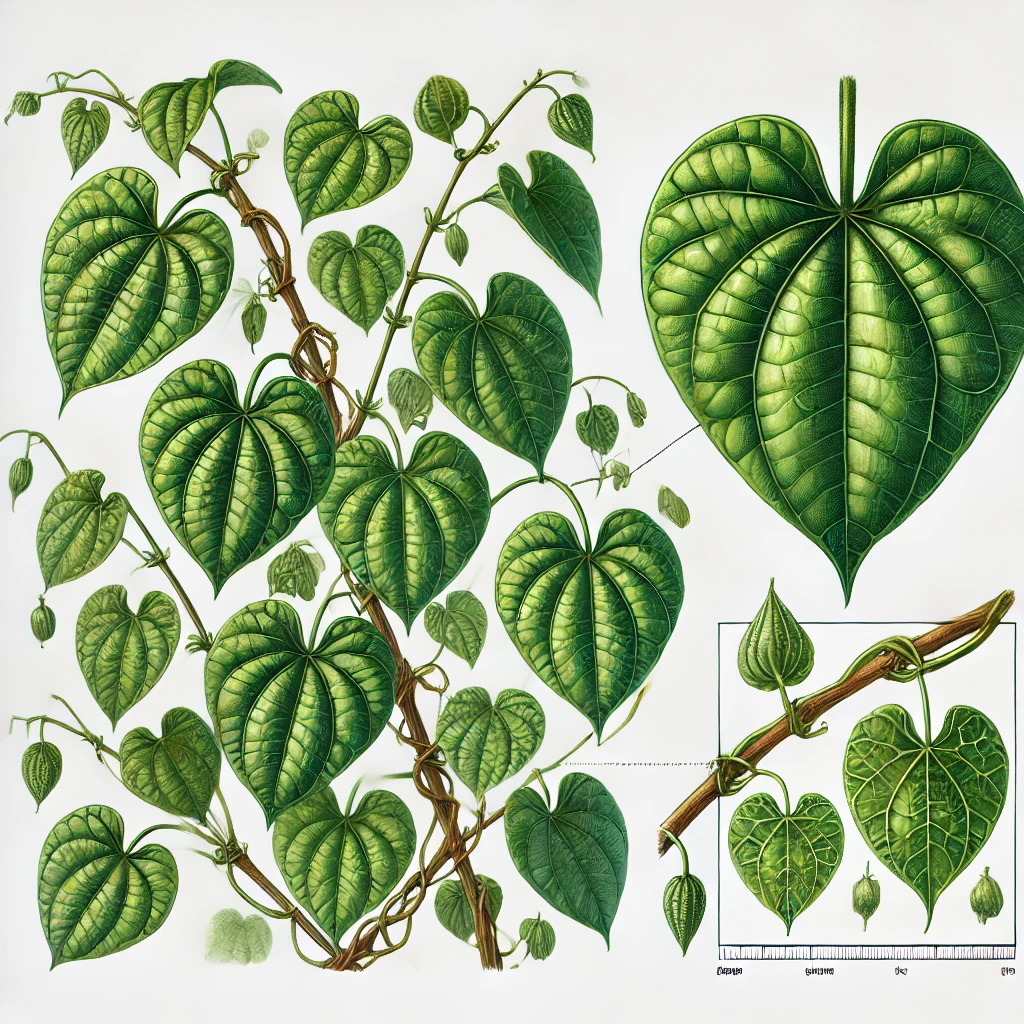Betel Pepper (Piper betle): An Aromatic Leaf with Traditional Medicinal and Cultural Uses

Overview
Betel Pepper, also known as Piper betle, is a climbing vine from the Piperaceae family. Its leaves are widely used in South and Southeast Asia, both in culinary and medicinal applications. Known for its stimulating properties, Betel Pepper is traditionally chewed with Areca Nut (Betel Nut) and lime, forming a combination that holds significant cultural importance across various regions. The leaves of Betel Pepper are reputed for their antimicrobial, digestive, and stimulant effects, and are also valued in traditional medicine for their potential therapeutic effects on various health conditions.
Medicinal Activity
Antibacterial: Helps combat bacterial infections.
Antioxidant: Neutralizes free radicals, potentially reducing oxidative stress.
Antiseptic: Useful for disinfecting wounds and aiding in skin health.
Carminative: Relieves gas and aids in digestion.
Stimulant: Provides a mild stimulating effect, useful in conditions of fatigue or lethargy.
Expectorant: Aids in clearing respiratory passages and alleviates cough.
Aphrodisiac: Traditionally believed to enhance libido and vitality.
Antioxidant: Neutralizes free radicals, potentially reducing oxidative stress.
Antiseptic: Useful for disinfecting wounds and aiding in skin health.
Carminative: Relieves gas and aids in digestion.
Stimulant: Provides a mild stimulating effect, useful in conditions of fatigue or lethargy.
Expectorant: Aids in clearing respiratory passages and alleviates cough.
Aphrodisiac: Traditionally believed to enhance libido and vitality.
Therapeutic Indication
Respiratory Health: Effective in managing conditions like asthma, cough, bronchitis, and sore throat.
Digestive Health: Known to aid in digestion, relieve colic, gas, and dyspepsia, and address constipation.
Oral and Dental Health: Reduces halitosis (bad breath) and treats mouth ulcers, gum infections, and toothache.
Skin and Wound Healing: Its antiseptic and wound-healing properties are beneficial for treating boils, wounds, and skin infections.
Pain Relief and Inflammation: Useful in reducing pain, inflammation, and swelling associated with rheumatism and other conditions.
Reproductive Health: Used traditionally for its aphrodisiac properties and to address specific reproductive health issues.
Digestive Health: Known to aid in digestion, relieve colic, gas, and dyspepsia, and address constipation.
Oral and Dental Health: Reduces halitosis (bad breath) and treats mouth ulcers, gum infections, and toothache.
Skin and Wound Healing: Its antiseptic and wound-healing properties are beneficial for treating boils, wounds, and skin infections.
Pain Relief and Inflammation: Useful in reducing pain, inflammation, and swelling associated with rheumatism and other conditions.
Reproductive Health: Used traditionally for its aphrodisiac properties and to address specific reproductive health issues.
Prepration & Usage
Chewing and Oral Applications: Often chewed with Areca Nut and lime for a mild stimulating effect, as well as for oral and dental health.
Topical Use: Leaves or extracts are applied directly to wounds or inflamed areas for their antiseptic and healing properties.
Inhalation and Vapors: For respiratory health, betel leaves can be boiled, and the vapor inhaled to alleviate cough and congestion.
Topical Use: Leaves or extracts are applied directly to wounds or inflamed areas for their antiseptic and healing properties.
Inhalation and Vapors: For respiratory health, betel leaves can be boiled, and the vapor inhaled to alleviate cough and congestion.
Safety & Considerations
Possible Side Effects: May cause mild irritation to the oral mucosa with frequent use, especially when combined with Areca Nut.
Pregnancy and Lactation: Limited evidence on its safety during pregnancy; it is advisable to consult a healthcare provider.
Pregnancy and Lactation: Limited evidence on its safety during pregnancy; it is advisable to consult a healthcare provider.
Conclusion
Betel Pepper is a culturally significant plant with numerous health benefits. Its leaves offer a variety of therapeutic properties, particularly for respiratory, digestive, and oral health, as well as pain relief. Whether used alone or in combination with other ingredients, Betel Pepper is a valuable addition to traditional medicine practices.
